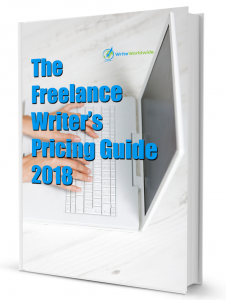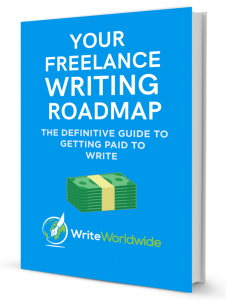This is a guest post by Kayleigh Alexandra, a community writer for Micro Startups.
So, you’re a freelance writer (or you’re planning to be one) and you’re trying to figure out what directions to take — after all, you can essentially write about anything and find some kind of audience for it. How do you choose a niche to target?
Do you pick a trending topic from the world of social media? Follow a lifelong passion for electric guitar? Well, you can absolutely do either or both of those things, but if you’re looking for a road that’s paved with gold (and Bitcoins), then look no further than ecommerce.
Whether you’re a seasoned Amazon aficionado or the most reluctant of online buyers, the ecommerce industry has the potential profitability and flexibility to capture your interest. But what exactly is so special about it? I’m going to tell you.
Fresh content is always in demand
Every industry is profit-driven to a significant extent, but the ecommerce world is both incredibly direct about it and tremendously detail-oriented in its approach to business. Because everything traces back to leads and conversions, content marketing is given a much higher priority than it typically receives in fields less convinced of its real-world value (or their ability to achieve it).
In addition to that, the intense competition of the online marketplace pushes retailers to generate new content on a regular basis, as they know that anything less than their best effort will see them overtaken by big-spending rivals. They also understand that content has a compounding effect, particularly given that old content can be reused, reworked, and updated to become as-new copy years down the line.
Since ecommerce experts know better than just about anyone how vital high-quality content is for SEO, they want to rank for anything and everything they possibly can (sometimes to their detriment). The net result is that websites in the ecommerce sector — from store blogs to news trackers — are always looking for new contributions, and on a wide range of topics (as we’ll consider next).
There’s a huge amount to write about
The ecommerce world is vast, and not just monetarily. There’s just so much going on all the time. New stores pop up in niche industries, dominate, flame out, pivot, and reemerge under new management. Cryptocurrencies creep towards mainstream viability. Price wars rage, fads rise and fall, and new technologies arrive to further transform sales funnels everywhere.
And because people are always looking to enter the ecommerce world, either moving from physical stores or starting with retail in general, new and improved guides and tutorials are always sought after — with many people willing to pay for them. It’s not remotely surprising that the online advertising world is rife with banners about ‘how-to’ ebooks offering expert tips.
You’ll never be the first to write about something, but if you can build a step-by-step guide to something like ecommerce analytics that’s even slightly more comprehensible for new users than anything currently available, you can win a huge amount of traffic and industry recognition. And since you don’t need to be an expert yourself (you only need to be one step ahead of the people you’re writing for), you can go from being a novice to offering legitimately useful guidance within a short period of time.
Product copywriting is very important
The biggest retailers in the world craft their ecommerce pages incredibly carefully to get the best possible performance from them. They can look at their entire customer journeys and run A/B tests to confirm that great product descriptions can make the difference between repeat custom and lost sales.
Because of this, and because the people who make and sell products don’t always understand that much about selling them, you can find a great place lending a hand to do it for them. Use your creative flair to turn a boring chunk of product content into a rhetorical masterpiece.
You can be a part-time entrepreneur
Even if writing is all you ever want to do, it isn’t advisable to have it be the only arrow in your quiver. Times change, rates go up or down, and a busy time can turn into a dry spell without warning, leaving you looking for ways to stay productive. That’s why more and more people (particularly in creative roles) are turning their talents towards their own retail enterprises.
Due to the sheer flexibility of the digital economy that we touched upon earlier, you can view a range of businesses for sale, pick one to buy, and start turning a profit (or making a loss) without even leaving your house. Your writing skills will perfectly suit tweaking product copy to make it shine, and it’s the kind of convenience that perfectly fits an ambitious freelance writer looking to add to their revenue streams.
Or, if you want to commit more time to it, you can set up a store from scratch and turn it into a more serious business. Since you have writing chops, why not sell custom products? You can sell T-shirts, mugs, caps, and other items like that without getting involved in the production yourself — there are plenty of businesses that can do that kind of thing for you.
And then there’s affiliate marketing, which makes you money from recommending things that you might well want to recommend anyway. Through percentage cuts from affiliate link orders (and potentially client sponsorship deals), it’s entirely viable to make a full-time income from affiliate work. Put enough time into your personal writing and you could find yourself no longer needing to supplement your revenue with client work.
There’s gold in those virtual hills
For the reasons we’ve covered, and many more, the ecommerce industry is incredibly enticing for any savvy freelance writer. Not only can it provide a steady source of new opportunities (often with high-profile ecommerce stores that lack in the in-house expertise to produce really strong product or blog), but it can offer further lines of revenue through buying a webstore, building your own, and/or trying affiliate marketing.
Look no further than the world of ecommerce for your dream freelance writing destination. Plentiful client work and no shortage of opportunities to add to your income make it a natural fit for freelance writers everywhere. Give it a shot — you won’t regret it!
 Kayleigh Alexandra is a community writer for Micro Startups — a network dedicated to supporting small businesses of all shapes and sizes. Visit the blog for the latest entrepreneurial news and side hustle tips. Follow us on Twitter @getmicrostarted.
Kayleigh Alexandra is a community writer for Micro Startups — a network dedicated to supporting small businesses of all shapes and sizes. Visit the blog for the latest entrepreneurial news and side hustle tips. Follow us on Twitter @getmicrostarted.
Main image credit: Max Pixel



